
After your exam
Here you will find information on attainment bands, certificates, results enquiries, and everything you need to know after completing an RAD exam.
Attainment Bands | Certificates, Results Forms, Medals, and Replacements | Replacement Certificates | Exams Customer Feedback | Complaints, Results Enquiries, and Appeals | Recognition and Accreditation | Special Consideration | UCAS Point Allocation
Attainment bands
From January 2022, the attainment bands for RAD exams will be as follows:
| Result classification | Total marks | Medal classification (graded exams only) |
|---|---|---|
| Standard not attained | 0 – 39 | n/a |
| Pass | 40 – 54 | Bronze |
| Merit | 55 – 64 | Silver |
| High Merit | 65 – 74 | Silver |
| Distinction | 75 – 84 | Gold |
| High Distinction | 85 – 100 | Gold |
Class Awards attainment descriptors:
| Attainment | Descriptors |
|---|---|
| Not shown | The elements to be assessed were not shown |
| Occasionally | The candidate showed an ability to achieve the required assessment criteria some of the time |
| Generally | The candidate showed an ability to achieve the required assessment criteria approximately half of the time |
| Frequently | The candidate showed an ability to achieve the required assessment criteria almost all of the time |
If the attainment descriptor not shown is given in any section, then the class award will not be obtained.
The ‘marks’ given on results listings (within RAD Online Exams Entries) against class awards are actually indicators of the text that will appear on the assessment form. ‘1’ equates to ‘occasionally’, ‘2’ to ‘generally’, and ‘3’ to ‘frequently’, so for example, a mark of 2 against Technique for Primary in Dance class award would equate to ‘Generally demonstrated control and coordination’.
Certificates, result forms, medals, and replacements
Certificates
Certificates are fraud-proof and have a number of security features:
- Secure parchment paper
- Micro-numismatics (e.g. RAD Crest)
- Advanced holograms (e.g. RAD Crest or Logo)
- Specialist reactive inks
- Advanced security numbering
- Website document validation
- Controlled secure papers and toners
Here are examples of the RAD Main Certificate and Results Form.
Medals and bars
Successful candidates will also receive:
- Class awards – medal
- Grades 1–8 exam – medal
- Solo performance awards – bar
Gold, silver or bronze medals are awarded depending on the result of distinction, merit or pass.
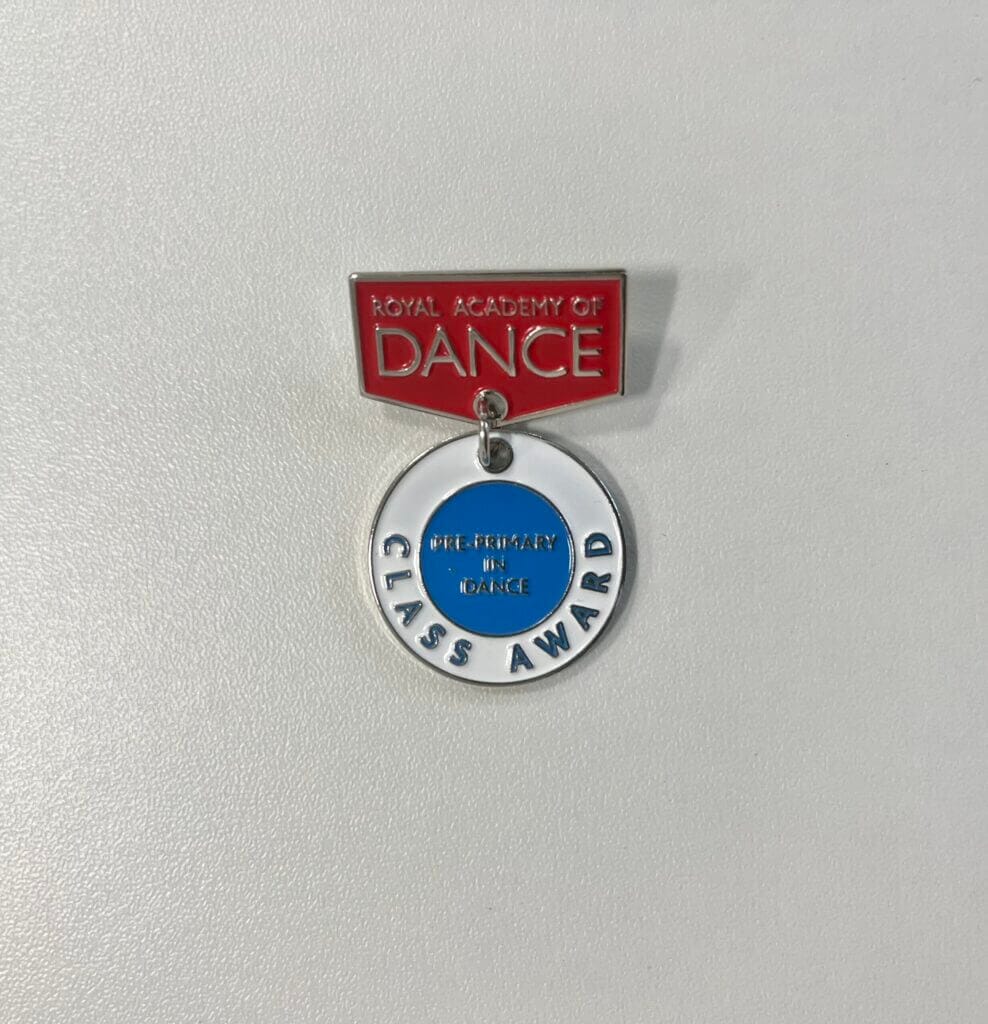
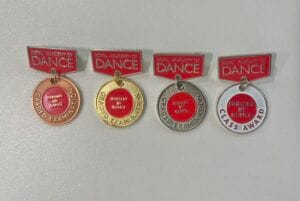
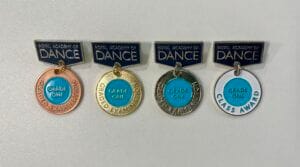
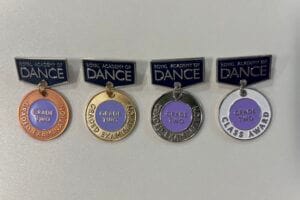
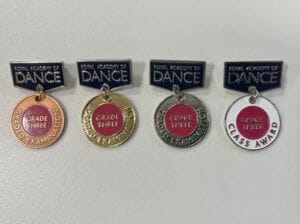
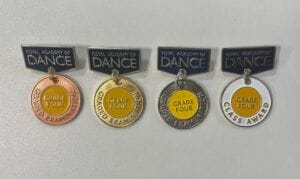
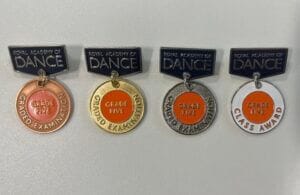
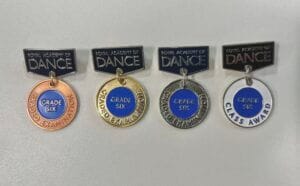
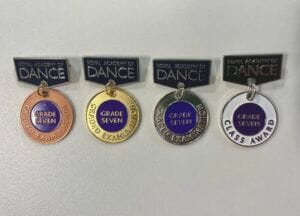
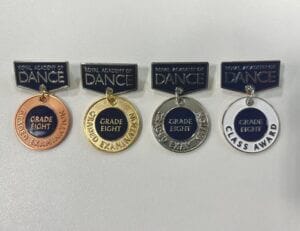
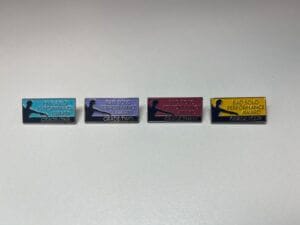
Awards Grades 1 4
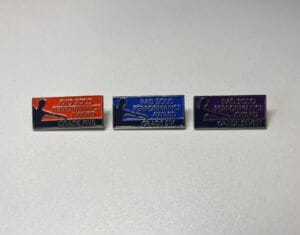
Please see policy and procedures for issuing results and certificates for more information.
Please note: We only provide medals for exams taken after 2011 for Pre-Primary in Dance class awards and Primary in Dance class awards/exams, and after 2013 for Grade 1-8 exams and Grades 1 – 5 class awards. We do not provide replacement medals for any exam or award prior to these dates.
Replacement certificates
If you lose or damage your certificate, medal, or result form, we may be able to provide a replacement.
For more information, as well as submitting a form for replacements, please click here.
Exams customer feedback
We value your feedback and your comments are important in helping us review and improve our services.
If you have general feedback regarding the RAD Examinations offer we appreciate your time in completing our survey:
Teacher Feedback survey
Please complete the survey.
This feedback is regularly reviewed.
If you have an enquiry please contact your local office, or alternatively contact exams@rad.org.uk. Please send any complaints to examscustomerservices@rad.org.uk.
Complaints, Result enquiries and Appeals
Teachers, candidates, or parents/guardians can request a result enquiry report for RAD exams. This includes a clerical check and a written report with the examiner’s encouraging and constructive comments on the results awarded. For this service, a fee of £40 (or equivalent) per candidate will be charged.
Teachers, candidates, or parents/guardians can also lodge a complaint about any examination procedures and processes.
These services take up to 40 working days to process, and the result enquiry application or the complaint needs to be made within 10 working days of the result being received. Result enquiries and complaints made after this time will not normally be accepted. All enquiries and complaints will be investigated thoroughly.
- To request a result enquiry complete the Result Enquiry Application Form
- To lodge a complaint, please contact the Examinations Customer Service via examscustomerservices@rad.org.uk
- For more information regarding this service, please consult the Complaints, Enquiries about results and Appeals policy.
Recognition and accreditation
Graded and vocational graded examinations and solo performance awards are awarded as qualifications accredited on the frameworks outlined below.
England, Wales and Northern Ireland
We are recognised to award qualifications on the Regulated Qualifications Framework (RQF) in England by the Office of Qualifications and Examinations Regulation (Ofqual), in Wales by Qualifications Wales, and in Northern Ireland by the Council for the Curriculum, Examinations and Assessment (CCEA).
The Regulated Qualifications Framework (RQF) provides a single, simple system for cataloguing all regulated qualifications.
- Information about the RQF
- Search for the RAD’s qualifications on the Register of Regulated Qualifications
We are also recognised to award qualifications on the Scottish Credit and Qualifications Framework (SCQF), by SQA Accreditation, a part of the Scottish Qualifications Authority.
Recognition outside the United Kingdom
Information about accreditation of qualifications outside the UK can be obtained from RAD national offices.
For more information about recognition and accreditation, please contact the Examinations Department exams@rad.org.uk
Graded exams
RAD exams are part of an internationally acknowledged system of assessments, drawing on the research and academic practices of twenty awarding organisations. These promote progressive mastery in music, dance, drama and musical theatre. For more information about how graded exams contribute to the development of performing artists of all ages and abilities, please see www.gradedexams.com
Special consideration
Overview
A Special Consideration is a post-assessment adjustment for a candidate who was prepared for and present at an assessment, but who may have been disadvantaged by adverse circumstances that arose immediately before (i.e. after the closing date), or at the time of the assessment.
Special Consideration is given when the Awarding Organisation, at its discretion, believes that the adverse circumstances are likely to have materially impacted the candidate’s ability to a) take the assessment or b) fully demonstrate their level of attainment in the assessment.
RAD’s assessments are a measure of what a candidate can demonstrate at one moment in time. The application of Special Consideration must not be misleading in regards a candidate’s achievements. In order to maintain the integrity of the assessment, therefore, only minor adjustments can be made.
Awarding a Special Consideration
Any decision to award special consideration will be based on a number of factors, which may vary from candidate to candidate and from one assessment to another. These factors may include the nature and severity of the circumstances and the date of the assessment in relation to the circumstances.
Each Special Consideration case is evaluated, and the outcome is determined on an individual basis. Such outcomes might include, but are not limited to:
- The awarding of a small amount of additional marks (i.e. Special Consideration marks).
- An offer to re-take the assessment.
- An offer to re-take the assessment in a different format (e.g. filmed assessment).
Application procedure
A teacher, parent/guardian, or candidate (if over 18) may apply for Special Consideration. Applications may only be submitted after the assessment has taken place and must be received by Examinations Customer Service via examscustomerservices@rad.org.uk within 5 working days of the assessment date. A Special Consideration application form and any medical documents need to be submitted as separate documents.
- Please read the Special Consideration policy and procedure before you complete your Special Consideration Application Form.
- Please find the RAD Examinations Privacy Policy.
- Forms and medical documents should not be given to the examiner on the day of the assessment.
How UCAS points are allocated for RAD exams
Graded and vocational graded exams in dance at RQF Level 3 are allocated points on the UCAS tariff.
This means that candidates who have achieved a pass or higher in Grades 6, 7, 8, Intermediate or Advanced Foundation, can use their RAD exam result towards their points tariff when applying to a course at a university or higher education in the UK.
UCAS has allocated the following tariff points to graded dance qualifications offered by the RAD, which are equivalent in level to RQF Level 3. These tariff points will be made available to higher education providers in a UCAS communication scheduled to go out on 5 April. These points are applicable to learners starting higher education in September 2023 and beyond:
| Exam | Pass | Merit | High merit | Distinction | High Distinction |
|---|---|---|---|---|---|
| Grade 6 | 8 | 10 | 12 | 14 | 16 |
| Grade 6 Solo performance award | 8 | 10 | 12 | 14 | 16 |
| Grade 7 | 12 | 14 | 16 | 18 | 20 |
| Grade 7 Solo performance award | 12 | 14 | 16 | 18 | 20 |
| Grade 8 | 16 | 18 | 20 | 22 | 24 |
| Discovering Repertoire Level 3 | 8 | 16 | 20 | 24 | 28 |
| Intermediate | 24 | 27 | 30 | 33 | 36 |
| Advanced Foundation | 30 | 33 | 36 | 39 | 42 |
Grade bands: 8-10 (Grade 8), 6-8 (Grade 7), 4-6 (Grade 6), 3-11 (Intermediate), 4-12 (Advanced Foundation)
Points apply to:
- Qualifications and Credit Framework (QCF) and Regulated Qualifications Framework (RQF) qualifications awarded from November 2010 onwards (January 2011 in Australia, Canada and South Africa)
- Qualifications accredited by Qualifications Scotland awarded from January 2012 onwards, including SCQF qualifications
- earlier qualifications, accredited on the National Qualifications Framework (NQF) and awarded from 2001-10 with the exception of Intermediate (as this was at Level 2 on the NQF).
When applying to UCAS online, the ‘centre no’ should be listed as ‘0000’.
You should be able to enter your centre name manually (on Education, UCAS). Click the option to add a school/college/centre and then click on ‘Find’. In the pop-up box, state the name of the school and then click on ‘Search’. The name won’t be found and a red link will appear in the pop-up box: ‘My school/centre is not listed here’. You should click on this and this will allow you to add the name of the school on the form.
